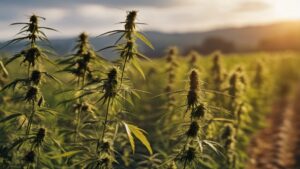So, What is Hemp?
Introduction:

Origins and Definition of Hemp:
To understand what hemp is, we must first define it. Hemp refers to a variety of the Cannabis sativa plant species specifically cultivated for industrial purposes. Unlike marijuana, which contains high levels of tetrahydrocannabinol (THC) and induces psychoactive effects, industrial hemp contains minimal THC concentrations, typically below 0.3%. This crucial distinction sets hemp apart as a non-intoxicating crop with diverse applications.
Historically, hemp has been cultivated for thousands of years, with evidence of its use dating back to ancient civilizations. Cultivated primarily for its fibrous stalks and nutritious seeds, hemp played a vital role in various cultural, economic, and industrial endeavors throughout history. From textiles and paper to food and construction materials, hemp has been a versatile and invaluable resource for human civilization.
Properties and Composition of Industrial Hemp:
Industrial hemp boasts several unique properties that contribute to its widespread utility. The plant’s fibrous stalks contain long, strong fibers suitable for textiles, ropes, and building materials. Additionally, hemp seeds are rich in protein, essential fatty acids, and other nutrients, making them a valuable source of nutrition and wellness.
Moreover, hemp plants exhibit remarkable resilience and environmental adaptability. They thrive in diverse climates and require minimal water, pesticides, or herbicides to grow successfully. This inherent hardiness makes hemp cultivation a sustainable and eco-friendly agricultural practice, reducing the ecological footprint associated with conventional crops.
Uses and Applications of Industrial Hemp:

In addition to textiles, hemp finds extensive use in paper production. Hemp paper is renowned for its superior quality and durability, as well as its environmentally friendly attributes. Unlike traditional wood pulp paper, hemp paper requires fewer chemicals and resources to manufacture, making it a more sustainable option for printing, packaging, and stationery.
Furthermore, hemp serves as a valuable source of nutrition and wellness. Hemp seeds are rich in protein, omega-3 and omega-6 fatty acids, vitamins, minerals, and antioxidants, making them a nutrient-dense superfood. Whether consumed raw, roasted, or pressed into oil, hemp seeds offer a range of health benefits, including improved heart health, digestion, and immune function.
Moreover, hemp-derived CBD (cannabidiol) has gained popularity for its potential therapeutic properties. CBD is a non-intoxicating cannabinoid found in hemp plants, renowned for its anti-inflammatory, analgesic, and anxiolytic effects. From oils and tinctures to capsules and topicals, CBD products offer a natural and holistic approach to wellness, without the psychoactive effects associated with THC.
Industrial hemp also holds promise as a sustainable alternative in the construction industry. Hempcrete, a mixture of hemp hurds (the inner woody core of the stalk) and lime, offers excellent insulation, moisture regulation, and fire resistance properties. Additionally, hemp-based composites can be used to manufacture durable and lightweight building materials, including panels, blocks, and insulation.
Environmental and Economic Benefits of Industrial Hemp:
The cultivation of industrial hemp offers numerous environmental benefits, making it a valuable asset in the fight against climate change and environmental degradation. Hemp plants have a high carbon sequestration capacity, meaning they absorb and store large amounts of carbon dioxide from the atmosphere during photosynthesis. Additionally, hemp cultivation helps mitigate soil erosion, promotes biodiversity, and reduces the need for chemical inputs in agriculture.
From an economic perspective, industrial hemp presents lucrative opportunities for farmers, entrepreneurs, and investors alike. With its diverse range of applications and growing market demand, hemp offers a profitable alternative to traditional crops. Moreover, hemp cultivation stimulates job creation, supports rural economies, and fosters innovation in emerging industries such as agrotech, biotechnology, and sustainable manufacturing.
Call to Action: Explore the World of Hemp at Hemp University:
As we’ve explored the multifaceted world of industrial hemp, it’s evident that this remarkable plant holds immense potential to transform industries, promote sustainability, and improve lives. However, this overview only scratches the surface of what hemp has to offer.
For those eager to dive deeper into the realm of hemp cultivation, processing, and utilization, we invite you to enroll in Hemp University. Developed by industry experts and leading academics, Hemp University offers comprehensive courses, workshops, and resources on all aspects of hemp production, innovation, and entrepreneurship.
Whether you’re a seasoned farmer looking to transition to hemp cultivation or an aspiring entrepreneur seeking to capitalize on the burgeoning hemp market, Hemp University provides the knowledge, tools, and insights you need to succeed in this dynamic industry. Join us on this exciting journey to unlock the full potential of industrial hemp and shape a more sustainable future for generations to come.







